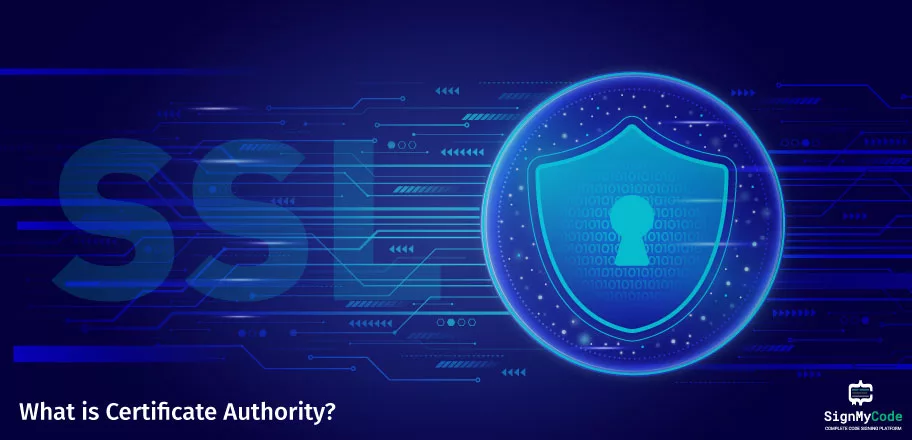What is a Certificate Authority & Key Role of Certificate Authority

Uncover the mysteries behind Certificate Authorities and how they play an integral role in secure communication. Explore what is a Certificate Authority comprehensive guide now!
Certificate Authorities (CA) play a key role when obtaining a digital security certificate. They are similar to driving licensing authorities but for the digital world where they verify the business identity before issuing any security certificate. They validate the website, devices, and people who made a request for the designated certificate.
The CA validation process ensures that end-users are interacting with who they think they are interacting with and not with others. But what exactly is a certificate authority, what are their roles, and what certificates do they offer?
Let’s get to know everything and address all your concerns about certificate authorities:
Overview of Certificate Authority
Certificate Authorities are considered trusted third parties that issue digital security certificates such as SSL, code signing, and others. They manage public keys and other credentials for data encryption and validate the entities such as websites, email addresses, companies, and others and bind them to cryptographic keys.
The CA is responsible for authenticating the company information and providing them with unique certificates. But before issuing the certificate, the CA will check with the Qualified Information Source (QIS) to validate the information supplied by the applicant.
The digital certificates offered by them will do the following things:
- Authenticate the credentials to validate the identity of the entity issued to
- Encrypt communication with the secure network over insecure networks
- Maintaining the integrity of signed documents so they can’t be altered by an unauthorized vendor
Role of Certificate Authorities
As mentioned, the primary role of the CA is to validate the identity of the entities the certificate is being issued to. Additionally, CAs have multiple crucial roles as they are an integral part of PKI. Here they are:
- Verification and validation of organizations, domain names, and identities
- Issuing the required security certificate to the applicant
- Establish trust between the interacting entities over the internet
- Keep a list of certificate revocation
For conducting validation and issuing the certificate, CAs charge a nominal fee from the applicants. Their primary customers are server administrators and site owners that require these security certificates to configure their servers for secure communications.
Typically, you’d have to generate a key pair that includes a private key and a public key. Also, you’d have to generate a CSR (Certificate Signing Request), which is an encoded file that includes the public key and other data such as domain name, email, organization, etc.
The information included in the CSR varies depending on the validation type and the use case of the certificate. The private key provided to the applicant is kept secure and should never be shown to anyone, even to the CA.
Once the CSR is generated, send it to the CA for verification to digitally sign and issue the certificate to you. The key part of this issued certificate is called a chain of trust.
What is the Chain of Trust?
In digital security certificates, the validity of the certificate issued is verified through certificate hierarchy. This hierarchy is known as the chain of trust where certificates higher up in the hierarchy will issue and sign the certificates. The chain of trust consists of:
- Trust anchor – Originating certificate authority
- Intermediate certificate – Serves as an “insulation” between the applicant certificate and CA
- Applicant certificate – To validate the identity of the applicant such as business, person, or website.
You can easily check the chain of trust by inspecting the SSL/TLS certificate in a browser, where you’ll find the breakdown of the same. It’ll include a trust anchor, intermediate certificate, and applicant certificate. Each validation point is backed by the previous layer’s validity that originates from the trust anchor.
Chain of trust is essential as it ensures security, scalability, and standard compliance along with maintaining privacy and trust for those who rely on the applicant certificate. For a complete chain of trust, it becomes necessary for a certificate to successfully confer CA’s trust.
What is Trust Anchor?
A trust anchor is the root Certificate Authority (CA) that establishes the chain of trust. The validation of the rest of the layers in the chain depends on the validation of the trust anchor.
Major software companies will include the root certificate in their browser and operating system if the CA is publicly trusted.
Doing so ensures that the certificate in the chain leads back to the root CA certificate, which is trusted by the browser.
What is an Intermediate Certificate?
The intermediate certificate is signed by the root CA and provides the flexibility to validate the trust anchor, intermediate, and applicant certificate. Intermediate certificates have an administrative function and are used for a specific purpose, for instance, issuing SSL/TLS or code signing certificates.
Intermediate certificates also work as a buffer for root CA and applicant certificates and help protect the root key from getting compromised.
CA/B forum’s Baseline Requirement forbids the trusted CA to directly issue applicant certificates from the root CA. Thus, there will always be one intermediate certificate in the root CA’s chain of trust.
What is an Applicant Certificate?
The applicant or end-entity certificate is the final layer in the chain of trust. It serves to confer the CA’s trust to the applicant’s business, website, or individual person using the intermediate certificate in the chain.
The applicant certificate differs greatly from the intermediate certificate or trust anchor in the aspect that it can’t be utilized for issuing additional certificates. The chain of trust ends here as the applicant certificate is the final layer.
What Types of Certificates are Offered by Certificate Authorities
Certificate authorities issue several different types of certificates based on the applicant’s requirements. For instance, here are some of the digital security certificates offered by the CAs:
SSL/TLS Certificate
A Secure Socket Layer is a security protocol used for encrypting the user session between the web server and web browser. The SSL/TLS certificate is used for the authentication of the website’s owner to generate encrypted HTTPS connections.
It prevents cybercriminals from reading or modifying the information transferred between two systems by keeping the internet connection secure. A padlock sign on the website you visit indicates that it’s protected by the SSL certificate issued by a trusted certificate authority.
Code Signing Certificate
A code signing certificate is another digital security certificate offered by a trusted CA to authenticate the identity of a software/code publisher. It binds the identity of a business with the public key, which is mathematically related to a private key.
The certificate uses the private and public key networks known as Public Key Infrastructure (PKI). The developers will sign the code with a private key which they keep private with themselves, while the end-user will use the public key to verify the developer’s identity.
Email Signing Certificate
Since emails are an integral part of our life, an email digital signature certificate or email signing certificate enhances email security. It’s an S/MIME certificate based on the PKI network that enables you to digitally sign and encrypt the contents of an email.
It uses asymmetric encryption keys to encrypt and decrypt email messages or their attachments. The email signing certificate will ensure that the emails are secure while in transit or when at rest. The hashing function in an email signing will alert the recipient if it’s been altered or not.
Object Signing Certificate
It’s used for digitally signing an object to verify the object’s integrity and ownership. CA-issued certificates are used for signing a variety of objects that include objects in the Integrated file system.
For proper authentication of the object signature, the receiver of the signed object must have access to the corresponding certificate.
User/Client Certificate Signing
These types of certificates are used for validating the user or clients that own the certificate. They are primarily used by digital applications to validate users from a certificate rather than a username & password combination. CAs have started offering such kinds of certificates for users to easily authenticate themselves and access the apps quickly.
How Can I Get Code Signing Certificate from Trusted Certificate Authority?
Several renowned Certificate Authorities like Comodo, Sectigo, and Certera are available to get an OV code signing or EV code signing certificate for your software/code authentication. They offer different certificates based on your business and validation type, for instance, Individual, Organization, or Extended.
Individual and Organization Validation certificates are almost identical in features and benefits they offer. Extended Validation goes a step further for validation where a CA would ask for certain documents to prove your business’s legality and legitimacy.
EV code signing certificate is more suitable for large-scale software publishers with multiple products. OV certificates, on the other hand, have fewer validation requirements and are more suitable for small-scale businesses.
Once you decide to get the certificates, generate a Certificate Signing Request (CSR) with your CA. Once that’s done, the CA will provide you with private keys, which you need to store at a safe location along with your CSR.
The CA now will commence the validation where CA requires the applicant to provide certain documents for identity proof like business registration details. Once that completes successfully, CA will issue you a code signing certificate.
Conclusion
In a nutshell, Certificate Authority poses a vital role in issuing digital security certificates that serve a variety of purposes. The CAs follow a chain of trust to ensure website operators and users stay protected from digital vulnerabilities.
CAs offer a variety of certificates including SSL, code signing, email signing, and others. These certificates come with different validation types such as OV and EV. Purchasing either of the certificates from trusted resellers or distributors instead of a CA would help you save a great amount of money.
Resellers like SignMyCode offer the same code signing and other certificates at affordable prices. We are a trusted reseller of code signing certificates offered by renowned CAs. Explore our range of certificates and buy any according to your own needs.


